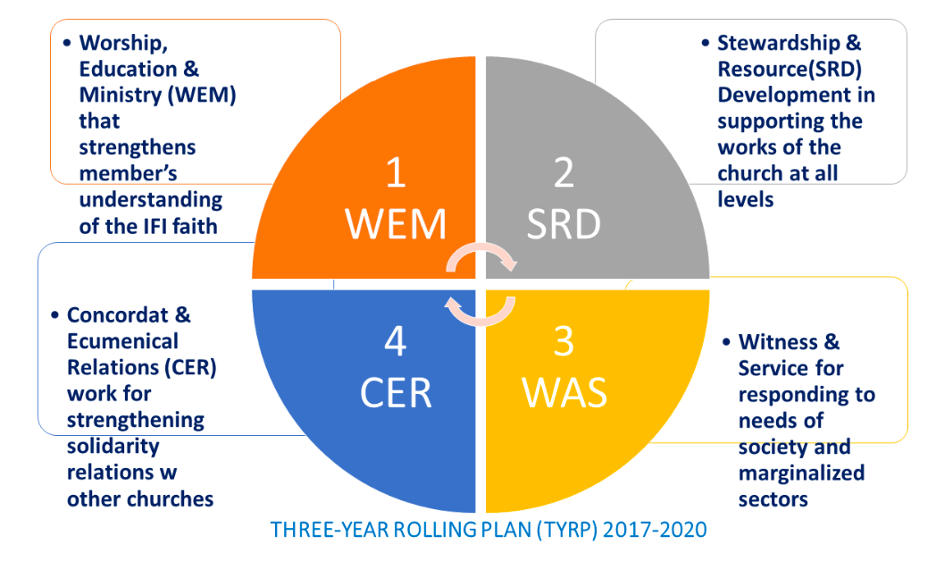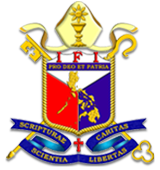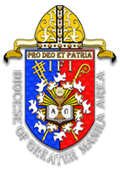THREE-YEAR ROLLING PLAN
(2017-2020)
CONTENT
- BACKGROUND AND RATIONALE
- PROGRAM METHODOLOGY
- THREE YEAR ROLLING PLAN
A. GOAL 1: Worship, Education and Ministry (WEM)
B. GOAL 2: StewardshipandResourceDevelopment (SRD)
C. GOAL 3: WitnessandService (WAS)
D. GOAL 4: Concordat and Ecumenical Relations (CER)
THREE-YEAR ROLLING PLAN
(2017-2020)
I. BACKGROUND AND RATIONALE
The TYSP II was approved during the 13th IFI Triennial General Assembly on May 7-9, 2014) which carries the theme “Spirit of God, Strengthen the Bond of Our Unity and Sustain Us in Our Journey”. The first three-year rolling plan (TYRP 2014 – 2017) of the IFI TYSP II, inspired and guided by the triennial theme, bearing in mind the vision, mission, and goals articulated in the TYSP II document.
True to the 13th General Assembly’s mandate, the first three-year rolling plan was carried out with the central effort of rallying the whole church to further intensify the missionary call to serve God and country by strengthening the bond of our unity and calling upon God to sustain us in our journey. The foregoing features and major components of the TYSP as well as the key priority concerns served as the framework for and provided guidance in the implementation of TYRP 1. It is noteworthy to mention that our work and ministry on human development flourished in TYRP 1. However, there were some planned activities that were stalled, due to the recurring problem of inadequate human, material and technical resource.
The COPP monitoring committee and Obispado Maximo conducted TYRP evaluations in selected dioceses. Results of the evaluation showed that there are items from the previous TYRP that should be carried over to the next triennial program. It is also notable to mention the recommendation to strengthen further the process of ensuring localization, interpretation and owning of nationally approved program goals in the diocesan program thrusts.
II. PROGRAM METHODOLOGY
- The TYRP will be discussed and promoted, after it is approved by the 14th Triennial General Assembly, to all Councils, such as the SCB, COP, and NLC, to the mandated organizations and the regional bishops conference for its adoption or implementation in their respective sectors or jurisdiction.
- Maximize/develop regional secretariats of regional conferences to serve as ad hoc regional program coordinating team with the task of assisting dioceses in their conference for the adoption, planning, implementation and monitoring and evaluation of the TYRP.
- Regular assessment and planning (semi-annual) will be conducted using the SWOT analysis to see to it that plans are smoothly carried and/or problems encountered are timely attended to.
- Annual internal evaluation will be undertaken, annual reports re-rendered to appropriate leadership bodies and partner agencies. Impact evaluation, summing-up and planning will be conducted by the end of the third year to ensure the continuity of TYSP II implementation.
III. THREE YEAR ROLLING PLAN

A group composed by representatives of the clergy and lay was convened by the Obispado Maximo to develop a realistic and doable plan of action, given the existing technical, material, financial and human resources at the central office. The following plan of action has been SMARTly (Specific, Measurable, Achievable, Result-Oriented, Time-Bounded) formulated.
- GOAL 1: Education, Worship and Ministry for strengthening the membership’s (clergy and lay) -knowledge in the IFI history and teachings, both spiritual and phenomenal.
ACTIVITIES
- Review and elaboration on the importance of church documents, to wit:
- Declaration of Faith and Articles of Religion (DFAR)
- Statement on Aglipayan Spirituality
As a strategy of enhancing in the education and strengthening the IFI membership’s knowledge in history and teaching of our Church, the DFAR must be fully articulated, discussed, studied and explained to the faithful.
A Theological Commission was created, composed of selected IFI theologians, in order to undertake extensive research and study of DFAR. After its creation, the Commission met a set plan and formulate action in the conduct of research and study. The Commission was able to make its initial research and studies and formulate initial drafts in some areas of the DFAR, as well as with Aglipayan Spirituality.
Following the research and study, a Theological Conference shall be called by the Church, probably in January 2018, in which the result of the research and study of the Commission shall be presented for discussion. Once the insights and result of discussion during the Conference are gathered; the Commission will meet to formulate the first draft of their research and study. The formulation of the initial draft and finalization thereof could be done from February until April 2018.
The first draft of the annotation of DFAR shall be presented to the Supreme Council of Bishops (SCB) for their study and appropriate action during the May 2018 meeting.
The Theological Commission would then re-write the draft based on the recommendations or suggestions of the SCB. Then, the second draft of the study would again be presented to the SCB during their September 2018 meeting.
The second draft of the study of DFAR would have been presented to the SCB, the same is to be carried for a series of discussion in the National Lay Congress or lay sectoral meetings and the National Clergy Convocation or NPO meetings from the national level down to the regional and diocesan levels. The activity should be done from September 2018 until August 2019. The result of these series of studies and discussions could be enriched by the SCB during its meeting in September 2019.
The Theological Commission would meet to discuss and plan on the conduct of research and study on the Statement of Aglipayan Spirituality. This meeting could be done by September 2019 while the research and study could be conducted from October until December 2019. The following month, January 2020, a theological conference shall be called to discuss the result of the research and study of the Statement of Aglipayan Spirituality. The draft of the study and discussion by the Theological Commission would be presented to the SCB during its meeting in March 2020 for their appropriate action.
For the purpose of continuity with regards to the initial study and written and focused drafts, the re-appoint of the incumbent members of the theological commission is essential.
- National Summit and Consultation on Liturgy and Music
Worship, Sacrament and Liturgy are at the core of our life as a Church. Thus, it is fitting that our worship should reflect our life as members of the Catholic faith. Preceding Officio Divino and Filipino Missal, the latest Mass Guide which the Church has mandated for use is the Order of the Mass. While the Filipino Ritual needs to be updated.
There were initiatives from the local churches to produce their liturgical guide for worship and other sacramental services.
Observations from the dioceses regarding the variations on practices of the dioceses in gestures/rubrics done during worships. And have recommended that there should be efforts to have a common liturgical practice. To gather, consolidate and unify the varied practices of our dioceses. The consultation will be held in the first quarter of 2018.
Hence, the Commission of Liturgy will be tasked to develop a concept with activities whose main objective is t gather and share the liturgical guides and practices of our dioceses for discussion and produce a unity statement. Its output will then be used by the Commission on Liturgy and Music who will discuss and forward the same to the SCB and, Workshop and Summit on Liturgy and Music within 2018 up to the first half of 2019, have an updated and unified liturgy.
- To develop and IFI framework on theological education and curriculum enhancement on sexuality and gender.
During the January 2017 meeting of the Committee on Theological Education and Ordained Ministry (CTEOM), there was a discussion on the importance of developing a national framework of theological education in the Iglesia Filipina Independiente. It was also discussed that while the Supreme Council of Bishops has been active in discussing sexuality and gender in the IFI, it is then necessary for the two IFI seminaries to have a discourse on sexuality and gender and enhance their curriculum.
Hence, the Church needs to gather the faculty of two IFI seminaries for a consultation on theological education and conference on human sexuality and theology. The conference and consultation aims to draft the IFI framework for theological education and have a common understanding and unity on including courses on sexuality and gender in theological studies. Saint Andrews Theological Seminary will be invited to send representatives as active observes to share in the gathering on October 2017.
Unities of the consultation and conference will then be collated by the CTEOM who will then present the same to the December 2017 Execom meeting, upon its adoption and refer the same to the SCB in their February 2018 meeting, comments and suggestion will then be collated by the CTEOM for presentation to the Execom to be presented and approved on March 2018 meeting.
- Conferences on Human Sexuality and Gender
The Obispado Maximo has initially started conversations on sexuality and gender, gathering advocates for gender justice and equality, lay and ordained members of the church, discussing issues being confronted by IFI members who are LGBTQ+. The Supreme Council of Bishops, after series of studies and discussion on human sexuality and gender have produced a statement on LGBT.
The conferences on human sexuality and gender justice and equality are then very timely; for the Church to engage in conversations and dialogue, not just on academic and theological, but involving church leaders to discuss the experiences of people, involving those that belong to the minority, would give birth to a common understanding and unity on the IFI’s stand on LGBTQ+ and essential issues which affect them, the church and society in general.
- To implement and evolve a human resource development program for clergy and lay
Our efforts in strengthening the clergy and lay formation program should be pursued in this triennium. To sustain and develop our mission and evangelism activities, encourage people who will dedicate themselves to take part in the ministry entrusted to the Church.
5.1. Vocation campaign and clergy development
Consultation on vocation and its campaign, regional seminaries, workshops, and continuing theological education are to be launched along with the continuing monitoring on the CPMD in the local churches.5.2. Lay Ministry Development
Gather the local church efforts and further develop the lay ministry formation program.5.3 National consultation on local church management: best practices and characteristics of a dynamic diocese
We need to gather our efforts in pursuing this activity this triennium; to discuss the nature and characteristic of a local church and its relationship with the national office and the parishes. The consultation will be held before the end of 2017.
- Enhancement and development of all IFI schools thru regional and national conferences, trainings and forums.
- Review and elaboration on the importance of church documents, to wit:
- GOAL 2: Stewardship and resource development in supporting the work of the Church at all levels.
ACTIVITIES
- To nurture responsible Christian stewards in the leadership bodies on national, diocesan and parish levels.
- To hold a conference on Christian stewardship dovetailed with the national consultation on local church management
Christian stewardship is a way of life among Christians. There are previous documents on stewardship and these should be reviewed and enhanced for dissemination and popularization to our faithful. The document on Christian stewardship and the document on the centralization of funds will be presented by the episcopal committee on Christian stewardship of the Supreme Council of Bishops in their meeting on 2019.
2.1. A comprehensive plan on forming responsible Christian stewards in the leadership bodies.
2.2. A policy position on centralization must be discussed again and contextualize it according to the needs of the dioceses and based on the experiences of the local Church who implemented 60/40 scheme that was approved by the last general assembly.
2.3. Church paper on tithing. Produce biblico-theological reflections (BTR) and other promotional materials explaining the importance of tithing as a way of life of every Christian. A national conference on Christian stewardship will be held in the last quarter of 2018. and the result of this activity will be presented to the Execom and Supreme Council of Bishops.
- On Property development
3.1. Inventory of Church properties. The purpose of the inventory of church properties is to identify and determine the number of our properties and to assess these properties in terms of prioritizing and titling and establishing our ownership including the needs for development or disposal.
3.2. Complying with the legal requirements to have titled church properties. The purpose of complying the legal requirements is to secure and safeguard our church properties by establishing our legal ownership through registration or titling or, at least, securing the deed of donations of said properties.
3.3. To present a draft plan of National CREAM on taking into account all properties of the Church and relay the same to the Diocesan CREAM and develop its own local plan which to the compliments the CREAM national plans.
- Reviewing systemizing and popularizing Church policies and their guidelines on program implementation.
- Develop IFI human resources to support the TYSP II implementation.
- To nurture responsible Christian stewards in the leadership bodies on national, diocesan and parish levels.
- GOAL 3: Social services and witness for responding to the needs of the IFI’s membership (clergy and laity) and of the organizations of marginalized sectors that the church works with.
ACTIVITIES
- To develop and strengthen the national program and other development programs being implemented in support to the struggle of the basic sectors.
Our church for the past triennium has grown strong in terms of her witnessing with, advocacy and services for and with the poor, oppressed and marginalized sectors of the society. Based on the evaluation of TYSP I, there are projects and
programs that were implemented in the local churches and even in some parishes.1.1 Develop a concept paper for a study and plan on having a separate desk/office/department and structure which will serve as the center of communication and coordination of all human development work of the church.
In the previous triennium, we were able to hold two national consultations; the project holders’ consultation and consultation on humanitarian response and development. Both consultations recognized the IFI’s growth in terms of its concern and work for human development.
1.2. The conduct of capacity building workshops on development planning using the Asset-Based Community Development (ABCD) approach.
It is very eminent that we, in the past three years have flourished in terms of developing service-oriented projects and programs which respond to the needs and struggles of the poor and marginalized sectors in society. Typically, churches tend to render services using the needs-based approach.
his activity will help and equip local churches to discern and development plan for their community using the ABCD approach as opposed to the needs-based approach.
The IFI Visayas Mindanao Regional Office for Development has been successful in using the ABCD approach. Thus, VIMROD with the Program Department will be tasked to facilitate the capacity building seminar and workshop.'
- IFI conference on Promotion and Upholding Children’s Rights Initiatives
Children have a vital role both in future of the society and of our church. They are also considered as the most vulnerable sector in the society. Thus, we need to gather our efforts in ensuring that their rights and welfare are protected and upheld. Regional and National summits are to be conducted in 2019. Convening stakeholders of the IFI (such as Bishops, Diocesan Program Officers, School Heads / Principals and existing Coordinators of existing IFI projects advocating for children’s rights.
- To develop and strengthen the national program and other development programs being implemented in support to the struggle of the basic sectors.
D. GOAL 4: Concordat and international ecumenical work for strengthening solidarity relations with other churches and faith-based institutions
- To come up with a comprehensive paper on concordat and inter-faith relations
The need for a manual on concordat relation is deemed necessary in our connection with other Christian churches. The Committee on Ecumenical Relations and International Affairs (CERIA) will be tasked to draft a paper that will be presented to the Execom in 2018.
- To conduct a round table discussion on concordat relations with partner churches and interfaith churches.
After having a manual or policies in our understanding on concordat relations, we need to discuss it with our partner churches and partner organizations.
2.1. Consultation on IFI Filipino chaplaincy abroad to produce policies and guidelines on Filipino chaplaincy agreement.
- The holding of a round table discussion with the Baptism, Eucharist, and Ministry document.
The World Council of Churches document on Baptism, Eucharist and Ministry is the basis of common understanding of other Christian denominations in doing the mission of the church.
Ecumenical friends specially member-churches of the National Council of Churches in the Philippines, will be invited to this activity. Efforts of reaching out to the Roman Catholic Church should also be exerted.
The discussion is suggested to be conducted in November as part of the celebration of the Ecumenical month in the country and within the triennium.
- Pursue to explore the possibility of having concordat relations with the Evangelical Lutheran Church of America (ELCA)
Follow up the initial discussions on the possibility of having a concordat agreement between the IFI and ELCA. The two dioceses in the United States and Canada especially the Diocese of Tampa will represent the IFI.
- Develop South to South engagement or dialogue on the possibility of having concordat and ecumenical relations
Further developing ecumenical engagements are to be continuously exerted in this triennium.


